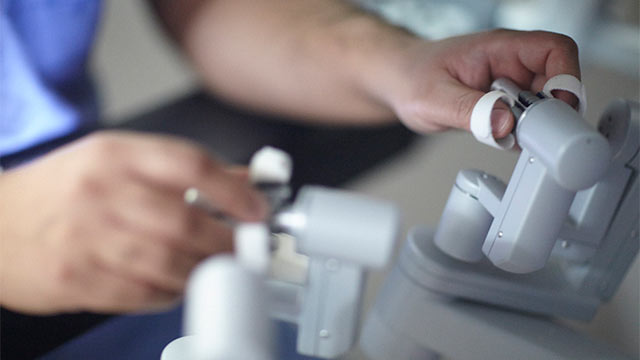
Mount Sinai Robotics Institute
For nearly two decades, surgeons at Mount Sinai have been at the forefront of robotic surgery and refining its techniques. Led by Dr. Eric M. Genden, Chair of Otolaryngology – Head and Neck Surgery and Dr. Ash Tewari, Chair of Urology, the Mount Sinai Robotics Institute was established in 2016 to encompass robotic surgery services across multiple Departments at the Mount Sinai Health System and to cohesively enhance patient outcomes, physician training, and robotic surgery technology.
Multidisciplinary Robotic Services at Mount Sinai
Surgeons at Mount Sinai have employed robotic surgery as a treatment for a variety of conditions including:
- Urological disease (adrenal, bladder, kidney and prostate)
- Oral and throat (head and neck) cancers
- Cardiovascular disease
- Neurological conditions
- Gynecologic conditions
- Sleep apnea
- Thoracic conditions (esophageal and lung)
Groundbreaking work such as new techniques and refinements, and complication reduction programs in these areas has distinguished MSRI as an international leader in robotic and minimally invasive surgery. Educational programs and clinical research programs across the Health System have been instrumental in achieving outstanding outcomes.
About the MSRI Co-Chairs Dr. Eric Genden and Dr. Ash Tewari
Eric M. Genden, MD, MHA, FACS, the Dr. Isidore Friesner Professor and Chair of the Department of Otolaryngology—Head and Neck Surgery at Mount Sinai and co-chair of the Institute performed the first transoral robotic surgery (TORS) in New York in 2008 in advance of the U.S. Food and Drug Administration’s approval of the technique for head and neck cancer surgery in 2010. “We were an early adopter of the da Vinci® Surgical System and we have been studying robotic oropharyngeal cancer treatment since then. We have found robotic surgery—for a variety of disease conditions—minimizes our patients’ recovery time and maximizes their outcomes.” Since then, Dr. Genden and his team have enhanced the TORS technology for removing tumors in the throat, tonsils, and base of the tongue to improve patients’ recovery, cosmetic appearance, and ability to speak and swallow.
“In the past, these tumors presented a significant challenge to reach, and traditionally were removed by surgeons through a large incision stemming from the top of the lip to the throat. However, the advent of robotic technology brought about a momentous paradigm shift in the removal of tumors and the benefits it delivers to patients,” says Dr. Genden. “Our studies have shown that minimally invasive robotic surgery has resulted in fewer days in the hospitals and fewer complications for patients.”
For robotic surgery in head and neck patients, Mount Sinai sends frozen sections of tumors at the time of surgery to pathology, which conducts a rapid turnaround of results while the patient is still asleep. If the cells are positive, the surgeon resects more to ensure margin accuracy. Additionally, the Head and Neck Cancer Research Program has a history of evaluating and utilizing new optical technologies for increased margin control and more precise tumor identification. For example, Mount Sinai was selected as the exclusive site for the Advaxis immunotherapy clinical trial for patients diagnosed with HPV-related oropharyngeal cancers, which is now entering Phase II.
Ash Tewari, MBBS, MCh, the Kyung Hyun Kim Chair of the Milton and Carroll Petrie Department of Urology at Mount Sinai and Co-Chair of the MSRI, developed the robotic prostate surgery technique called Advanced Robotic Technique prostatectomy or ART. ® It is a highly individualized technique that reflects a patient’s unique anatomy, cancer location, and neural structure while removing cancer and minimizing side effects in select patients. Through ART, Dr. Tewari delicately removes the prostate while preserving sexual and urinary function.
“At our Institute, we focus on patient education, clinical research and collaboration, and the study of health care outcomes, as well as training, and development of new technology,” says Dr. Tewari. In treating patients, Dr. Tewari and his team use a combination of precision medicine approaches including advanced imaging, genomics, and translational research. In addition, Mount Sinai has pioneered the use of NeuroSAFE, an advanced procedure that lets the surgeon know if all the cancer has been excised during the operation itself. It is the only institution in the United States currently using this technology. He also designed athermal and reconstruction techniques to minimize nerve damage during prostate cancer surgery and catheter-less surgery to minimize pain and discomfort for patients.
“The robotic urological cancer surgery program reflects almost two decades of experience and research into mastering and refining the robotic technique in order to ensure we achieve the highest levels of cancer control for patients while preserving nerves responsible for erectile function and continence,” says Dr. Tewari.
Other pioneering surgeons at Mount Sinai have also introduced significant innovations in the field of robotics. The first assistant sparing technique (FAST) robotic partial nephrectomy was developed by Ketan Badani, MD, Vice Chair of Urology and Robotic Operations at the Mount Sinai Health System. It specifically aims to reduce warm ischemia time to the kidney, preserve maximal normal renal function while removing the tumor, and minimize complication risk. The FAST approach has been taught and demonstrated throughout the United States at national meetings and internationally in twelve countries. Dr. Badani has published over 100 peer-reviewed manuscripts on the advancement of robotic technology and improvement in patient outcome.
Educating Residents and Fellows with the da Vinci Surgical System
Mount Sinai is also one of the only locations in the country dedicating a da Vinci Surgical System solely to teach residents and fellows robotic surgery techniques. The majority of users are urological, gynecological, head and neck and general surgeons. In addition, first-year medical students at the Icahn School of Medicine at Mount Sinai have the ability to take a Robotic Anatomy Training Day where students perform robotic surgery on cadavers. The course began eight years ago as the first of its kind in the United States, and Mount Sinai is still one of the only schools in the world to do it.